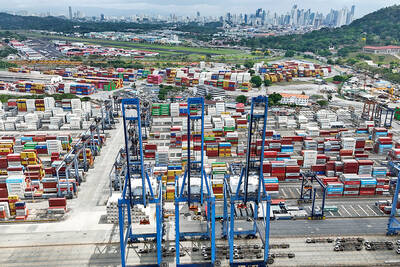The death of a Pinduoduo Inc employee has renewed criticism of the long hours commonly practiced at China’s technology companies, which are already under scrutiny by regulators for anti-competitive business practices.
The e-commerce company yesterday confirmed that an employee died last week after working past midnight, without providing additional details.
That sparked a social media backlash against the company and the relentless working schedules expected of its employees.
The so-called “996” office schedule — 9am to 9pm, six days a week, plus overtime — has previously spurred criticism following complaints from employees and deaths.
Technology billionaires, such as Alibaba Group Holding Ltd founder Jack Ma (馬雲) and JD.com Inc founder Richard Liu (劉強東), have endorsed the practice as necessary for survival in an intensely competitive industry and the key to accumulating personal wealth.
The online criticism adds to the challenges for China’s largest technology companies, which spent the past year fending off efforts by Washington to curb their growth, while navigating heightened regulatory scrutiny at home.
Despite that, Pinduoduo emerged relatively unscathed with its shares rising to a record high on Wednesday last week.
The shares ended last year up nearly 370 percent, helping to elevate founder Colin Huang (黃崢) to the position of China’s second-richest person, according to the Bloomberg Billionaires Index.

THE TRAGEDY OF PUNCH: Footage of the seven-month-old Japanese macaque has gone viral online after he was rejected by his mother and formed a bond with a soft toy A baby monkey in Japan has captured hearts around the world after videos of him being bullied by other monkeys and rejected by his mother went viral last week. Punch, a Japanese macaque, was born in July last year at Ichikawa City Zoo. He has drawn international attention after zookeepers gave him a stuffed orangutan toy after he was abandoned by his mother. Without maternal guidance to help him integrate, Punch has turned to the toy for comfort. He has been filmed multiple times being dragged and chased by older Japanese macaques inside the enclosure. Early clips showed him wandering alone with

Australian Prime Minister Anthony Albanese yesterday said he did not take his security for granted, after he was evacuated from his residence for several hours following a bomb threat sent to a Chinese dance group. Albanese was evacuated from his Canberra residence late on Tuesday following the threat, and returned a few hours later after nothing suspicious was found. The bomb scare was among several e-mails threatening Albanese sent to a representative of Shen Yun, a classical Chinese dance troupe banned in China that is due to perform in Australia this month, a spokesperson for the group said in a statement. The e-mail

‘OCCUPATION’: Hong Kong said it had lodged ‘stern protests’ with Panama’s consulate, and would ‘staunchly support’ the rights and interests of Hong Kong companies Panamanian President Jose Raul Mulino on Monday ordered the temporary occupation of two ports run by a unit of CK Hutchison Holdings Ltd following the Supreme Court’s ruling against the firm’s concession, escalating a dispute that has become a proxy battle between the US and China in Latin America. Mulino said in a speech that the administration and operation of the two ports on the strategic Panama Canal is to revert to the country’s National Maritime Authority to ensure their uninterrupted, safe and efficient operation. The occupation covers movable equipment at the ports and does not mean a definitive loss of

GAME CHANGER The Russian invasion of Ukraine has shown the utility of small drones for recon, for supporting logistics and for killing across the modern battlefield Five European nations have announced a new program to produce low-cost air defense systems and autonomous drones using Ukrainian expertise, hard-won over the past four years fighting against Russia. Friday’s initiative of the five nations — France, Poland, Germany, the UK and Italy — comes as one of many European efforts to bolster defense along their borders, like a “drone wall ” with Russia and Ukraine to better detect, track and intercept drones violating Europe’s airspace. Both Moscow and Kyiv have cutting-edge drone warfare capabilities forged in the grim laboratory of war where battlefield innovations have rewritten modern battle tactics. Poland is